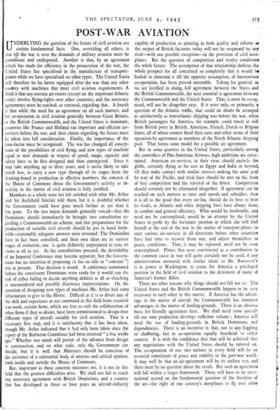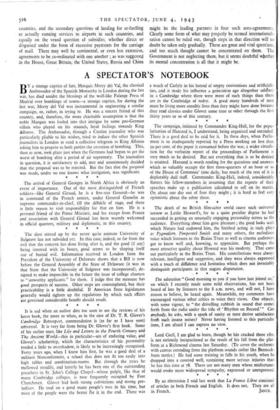POST-WAR AVIATION
UNDERLYING the question of the future of civil aviation are certain fundamental facts. One, overriding all others, is that till the war is over the demands of military aviation must be paramount and undisputed. Another is that, by an agreement which has made for efficiency in the prosecution of the war, the United States has specialised in the manufacture of ' transport- planes while we have specialised oa other types. The United States will therefore be far better equipped after the war than any other country with machines that meet civil aviation requirements. A third is that any oversea air-routes (except on the important Atlantic route) involve flying-rights over other countries, and the necessary agreements must be reached, or renewed, regarding that. A fourth is that while the need for an agreement on all such matters, and for co-operation in civil aviation generally between Great Britain, or the British Commonwealth, and the United States is dominant, countries like France and Holland ran important and efficient air- services before the war, and their claims regarding the future must be taken into full consideration. Finally, the importance of the time-factor must be recognised. The war has changed all concep- tions of the possibilities of civil flying, and new types of machine equal to new demands in respect of speed, range, capacity and safety have to be first designed and then constructed. Since it may take anything up to three years, and is never likely to take much less, to carry a new type through all its stages from the drawing-board to production in effective numbers, the concern of the House of Commons about the Government's activity or in- activity in the matter of civil aviation is fully justified.
Members as a whole were not left satisfied with what Mr. Attlee and Sir Archibald Sinclair told them, but it is doubtful whether the Government could have gone much farther as yet than it has gone. To the two major demands generally voiced—that the Dominions should immediately be brought into consultation re- garding a Commonwealth air scheme, and that preparations for the production of suitable civil aircraft should be put in hand forth- with—reasonably adequate answers were returned. The Dominitins have in fact been consulted, and their own ideas are in various stages of evolution; one is quite definitely unprepared to state its views at all as yet. As the consultations proceed, the desirability of an Imperial Conference may become apparent, but the Govern- ment has no intention of proposing (it has no title to " convene ") one at present. That decision is sound. A conference summoned before the constituent Dominions were ready for it would run the risk of either failing to decide anything definite at all or clutching at unconsidered and possibly disastrous improvisations. On the question of designing new types of machines Mr. Attlee had some information to give to the House. Difficult as it is to divert any of the skill and experience at our command in this field from essential war-work, certain firms, which are free to seek the collaboration of other firms if they so desire, have been commissioned to design four different types of aircraft suitable for civil aviation. That is a necessary first step, and it is satisfactory that it has been taken, though Mr. Attlee indicated that it had only been taken since the report 9f the Brabazon Committee had been received " a few weeks ago." Whether war needs will permit of the advance from design to construction, and on what scale, only the Government can decide, but it is well that Ministers should be conscious of the existence of a substantial body of anxious and critical opinion, both inside and outside the House of Commons.
But, important as these concrete measures are, it is not in this field that the greatest difficulties arise. We shall not fail to reach any necessary agreement with British Dominions„ and a country that has developed in three or four years an aircraft-industry capable of production so amazing in both quality and volume as the output of British factories today will not be surpassed by any rival—with one possible exception—in the provision of civil aero- planes. But the question of competition and rivalry conditions the whole future. The assumption of that relationship darkens the whole prospect for all concerned so completely that it would be foolish to entertain it till the opposite assumption, of harmonious co-operation, has been proved untenable. Taking for granted, as we are justified in doing, full agreement between the States and the British Commonwealth, the next essential is agreement between the Commonwealth and the United States That, it must be recog-, nised, will not be altogether easy. If it were only, or primarily, question of the Atlantic traffic, that could no doubt be arranged as satisfactorily as transatlantic shipping was before the war, when British passengers for America, for example, could travel at will from British ports in British, American, French, Dutch or Belgian liners, all of whose owners fixed their rates and other terms of their operation by agreement as members of the North Atlantic shipping pool. That forms some model for a possible air agreement.
But in some quarters in the United States, particularly among the controllers of Pan-American Airways, high ambitions are enter- tained. American air-services, in their view, should encircle the globe, certainly flying as far east as Egypt and India or beyond, till they make contact with similar services making the same goal by way of the Pacific, and rival lines should be met on the basis of free competition and the survival of the fittest. Competition should certainly not be eliminated altogether. If agreement can be reached on such matters as rates and speeds and subsidies, then it is all to the good that every air-line should do its best to beat its rivals, as Atlantic and other shipping lines have always done, in comfort and general efficiency. What would be intolerable, and need not be contemplated, would be an attempt by the United States to profit by the fortunate position in which she will find herself at the end of the war in the matter of transport-planes to start various air-services in all directions before other countries have had time to recover from war, and adjust themselves to peace, conditions. That, it may be repeated, need not be even contemplated. Planes that were constructed as a contribution to the common cause in war will quite certainly not be used, if any administration animated with similar ideals to Mr. Roosevelt's is in power at Washington, to create for America a privileged position in the field of civil aviation to the detriment of many of America's former Allies.
There are other reasons why things should not fall out so. The United States and the British Commonwealth happen to be very necessary to each other in this matter. If America has the advan- tage in the matter of aircraft the Commonwealth has immense advantages in the matter of landing-grounds. There is an obvious basis for friendly agreement here. We shall need some aircraft till our own production develops sufficient volume ; America will need the use of landing-grounds in British Dominions and dependencies. There is an incentive in that, not to any higgling or chaffering, but to co-operation equally beneficial to either country. It is with the confidence that that will be achieved that any negotiations with the United States should be entered on. The co-operation of our two nations in every field will be an essential constituent of peace and stability in the post-war world. It may well be that an air-agreement will be its earliest test, and there must be no question about the result. But such an agreement will fall within a larger framework. There will have to be inter- national accord on the -fundamental question of the freedom of the air—the right of one country's aeroplanes to fly over other countries, and the secondary questions of landing for re-fuelling or actually running services to airports in such countries, and equally on the vexed question of subsidies, whether direct or disguised under the form of excessive payments for the carriage of mail. There may well be continental, or even less extensive, agreements to be co-ordinated with one another ; as was suggested in the House, Great Britain, the United States, Russia and China might be the leading partners in four such area-agreements. Clearly some form of what may properly be termed internationali- sation cannot be ruled out, though steps in that direction will no doubt be taken only gradually. These are great and vital questions, and too much thought cannot be concentrated on them. The Government is not neglecting them, but it seems doubtful whether its mental concentration is all that it might be.



























 Previous page
Previous page